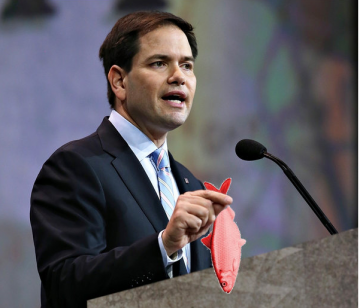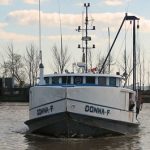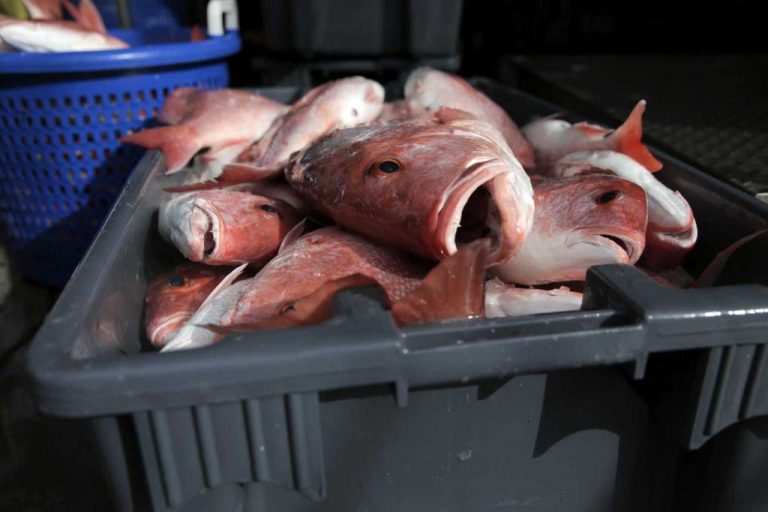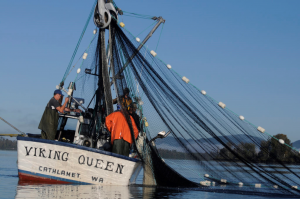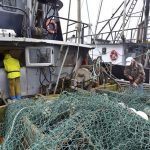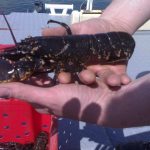Tag Archives: red-snapper
Red snapper dispute continued at Wednesday meeting
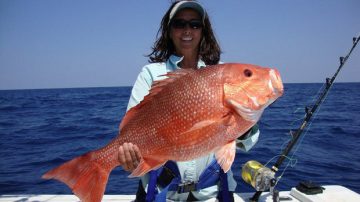 The war of words continued Wednesday during an all-day meeting in Baton Rouge designed to educate members of the Louisiana Wildlife and Fisheries Commission on red snapper management. A surrogate of Rep. Garret Graves, R-Baton Rouge, presented a letter declaring states would not be responsible for research funding under HR 3094, a bill authored by Graves and Rep. Cedric Richmond, D-New Orleans, that would transfer management authority to Louisiana, Texas, Alabama, Mississippi and Florida. That directly contradicted charges made by Charlie Melancon, secretary of the Louisiana Department of Wildlife and Fisheries, that the bill became an unfunded mandate when Rep. Rob Bishop, R-Utah, tacked an amendment to it. “Amending things to death is how you kill a bill,” Melancon told the crowd of industry leaders and interested anglers Wednesday. “What was done to (HR 3094) was an attempt to kill the bill.” But Paul Sawyer, Graves’ chief of staff, presented a letter, signed by Bishop, stating that his amendment merely banned the transfer of funds to the states for fisheries research because that research would continue to be conducted by NOAA Fisheries. Read the story here 12:31
The war of words continued Wednesday during an all-day meeting in Baton Rouge designed to educate members of the Louisiana Wildlife and Fisheries Commission on red snapper management. A surrogate of Rep. Garret Graves, R-Baton Rouge, presented a letter declaring states would not be responsible for research funding under HR 3094, a bill authored by Graves and Rep. Cedric Richmond, D-New Orleans, that would transfer management authority to Louisiana, Texas, Alabama, Mississippi and Florida. That directly contradicted charges made by Charlie Melancon, secretary of the Louisiana Department of Wildlife and Fisheries, that the bill became an unfunded mandate when Rep. Rob Bishop, R-Utah, tacked an amendment to it. “Amending things to death is how you kill a bill,” Melancon told the crowd of industry leaders and interested anglers Wednesday. “What was done to (HR 3094) was an attempt to kill the bill.” But Paul Sawyer, Graves’ chief of staff, presented a letter, signed by Bishop, stating that his amendment merely banned the transfer of funds to the states for fisheries research because that research would continue to be conducted by NOAA Fisheries. Read the story here 12:31
Better science and data, not catch shares
 With the exception of three mini-seasons (2012-2014) the red snapper fishery in the South Atlantic has been effectively closed for over six years. By most accounts from fishermen, red snapper are very plentiful – they are routinely encountered while fishermen target other species and divers report large schools. Yet, the stock assessment presented to the South Atlantic Fishery Management Council in June says that red snapper are still overfished and that overfishing is still occurring. This despite a lot of uncertainty about the data used in the assessment. Give the SAFMC credit for not accepting the assessment and asking its Scientific and Statistical Committee to reexamine the assessment and stock status determination this fall. The ongoing saga of the red snapper fishery highlights the fact that stock assessments can be flawed because of the lack of good biological and historical abundance information. In other words, much better science and data on our fisheries is needed. Instead of devoting adequate financial resources into stock assessments, NOAA has spent about $160 million over the last six years pushing its National Catch Share Policy in an effort to privatize fisheries. Studies have shown that catch share programs hurt fishing communities by destroying jobs and don’t provide any biological benefit to fisheries. 10:36
With the exception of three mini-seasons (2012-2014) the red snapper fishery in the South Atlantic has been effectively closed for over six years. By most accounts from fishermen, red snapper are very plentiful – they are routinely encountered while fishermen target other species and divers report large schools. Yet, the stock assessment presented to the South Atlantic Fishery Management Council in June says that red snapper are still overfished and that overfishing is still occurring. This despite a lot of uncertainty about the data used in the assessment. Give the SAFMC credit for not accepting the assessment and asking its Scientific and Statistical Committee to reexamine the assessment and stock status determination this fall. The ongoing saga of the red snapper fishery highlights the fact that stock assessments can be flawed because of the lack of good biological and historical abundance information. In other words, much better science and data on our fisheries is needed. Instead of devoting adequate financial resources into stock assessments, NOAA has spent about $160 million over the last six years pushing its National Catch Share Policy in an effort to privatize fisheries. Studies have shown that catch share programs hurt fishing communities by destroying jobs and don’t provide any biological benefit to fisheries. 10:36
Louisiana Wildlife and Fisheries commissioner dismissed for pushing red snapper resolution, she says
 A former member of the Louisiana Wildlife and Fisheries Commission says she was dismissed from the regulatory board after putting forward a resolution that irked Louisiana Department of Wildlife and Fisheries Secretary Charlie Melancon. Julie Hebert, who was appointed to the commission in October 2015 by then-Gov. Bobby Jindal, said she had received support from Gov. John Bel Edwards to have her term extended, but that was yanked after Hebert proposed a resolution supporting state management of red snapper. The resolution passed the commission unanimously in April. An avid recreational angler, Hebert said she’s been frustrated for years by what she views as federal mismanagement of red snapper. Fisheries biologists say the biomass of Gulf red snapper is higher than it’s ever been, and yet, recreational anglers have been squeezed down to annual seasons that are shorter than two weeks in federal waters. Read the story here 16:25
A former member of the Louisiana Wildlife and Fisheries Commission says she was dismissed from the regulatory board after putting forward a resolution that irked Louisiana Department of Wildlife and Fisheries Secretary Charlie Melancon. Julie Hebert, who was appointed to the commission in October 2015 by then-Gov. Bobby Jindal, said she had received support from Gov. John Bel Edwards to have her term extended, but that was yanked after Hebert proposed a resolution supporting state management of red snapper. The resolution passed the commission unanimously in April. An avid recreational angler, Hebert said she’s been frustrated for years by what she views as federal mismanagement of red snapper. Fisheries biologists say the biomass of Gulf red snapper is higher than it’s ever been, and yet, recreational anglers have been squeezed down to annual seasons that are shorter than two weeks in federal waters. Read the story here 16:25
An open letter to all red snapper fishermen – An allocation solution?
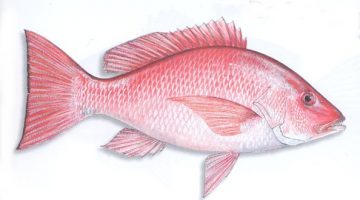 There has been no proposal that can satisfy all the stakeholders in the Gulf Red Snapper fishery—the commercial, recreational and charter fleet. The latest move to reallocate red snapper quota from the commercials to the recs has angered the commercials because it took money from their business without adding significantly to the recs season. The same thing happened when the charter fleet separated from the recs. It gave them a longer season at the expense of the recs season. If you gave all the quota to the recs, two viable industries would be shut down and only increase their season to 18 days, roughly. Compounding the issue are the different regulations in state waters. It’s easy to game the system when I can practically fish in three, maybe four, states from Dauphin Island. So what do we do? I would ask you to consider a Gulf-wide tag system for the recs, very similar to the system for commercials and charter fleet. How would it work? Read the rest here 12:16
There has been no proposal that can satisfy all the stakeholders in the Gulf Red Snapper fishery—the commercial, recreational and charter fleet. The latest move to reallocate red snapper quota from the commercials to the recs has angered the commercials because it took money from their business without adding significantly to the recs season. The same thing happened when the charter fleet separated from the recs. It gave them a longer season at the expense of the recs season. If you gave all the quota to the recs, two viable industries would be shut down and only increase their season to 18 days, roughly. Compounding the issue are the different regulations in state waters. It’s easy to game the system when I can practically fish in three, maybe four, states from Dauphin Island. So what do we do? I would ask you to consider a Gulf-wide tag system for the recs, very similar to the system for commercials and charter fleet. How would it work? Read the rest here 12:16
Opinion: Red Snapper recreational fishermen— Allow Reallocation Among Fishermen, want shift to state management
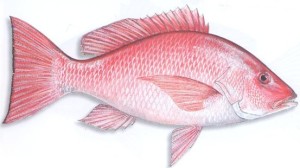 Many Gulf Coast anglers have been asking themselves what the world is coming to lately, when they can fish federal waters for red snapper for only a few days this year while commercial boats can take sport fishermen out anytime to catch snapper for the boat to sell. I sure wondered how that could be when, in April, I first heard about Texas captain Scott Hickman’s trips,” which — quite legally — allow him to take sport fishermen along to fill his fish boxes per the commercial catch shares he owns. He accepts no payment from these anglers, just as by law he can accept no tips. The anglers cannot legally keep any fish nor buy fish from Hickman. But they can buy fish caught that day from the fish house back at the dock — for a premium price (at least a few bucks more per pound than the usual market price). At first, this scheme seemed outrageous to me, as it apparently did to many in the recreational-fishing community. Then I started trying to put my finger on why it pissed me off, and mostly I came up with reasons why it shouldn’t, especially when considered within the context of our bizarro snapper-management regime. Read the rest here 10:30
Many Gulf Coast anglers have been asking themselves what the world is coming to lately, when they can fish federal waters for red snapper for only a few days this year while commercial boats can take sport fishermen out anytime to catch snapper for the boat to sell. I sure wondered how that could be when, in April, I first heard about Texas captain Scott Hickman’s trips,” which — quite legally — allow him to take sport fishermen along to fill his fish boxes per the commercial catch shares he owns. He accepts no payment from these anglers, just as by law he can accept no tips. The anglers cannot legally keep any fish nor buy fish from Hickman. But they can buy fish caught that day from the fish house back at the dock — for a premium price (at least a few bucks more per pound than the usual market price). At first, this scheme seemed outrageous to me, as it apparently did to many in the recreational-fishing community. Then I started trying to put my finger on why it pissed me off, and mostly I came up with reasons why it shouldn’t, especially when considered within the context of our bizarro snapper-management regime. Read the rest here 10:30
South Atlantic: Move surfaces to overhaul red snapper restrictions, limits
 Following the recent announcement that anglers will continue to be prohibited from keeping red snapper in the Atlantic Ocean this year, a member of the regional council that oversees fishing in the Southeast’s federal waters wants to overhaul how the species is regulated. Ben Hartig, a commercial fisherman from Hobe Sound, sent a letter last week to members of the South Atlantic Fishery Management Council that said current regulations are based on unreliable information about the red snapper population and number of fish caught. Hartig proposed a range of possible changes to the years-long, controversial plan in place to help increase the species’ numbers that, if pursued by the council, could go into place as early as 2018. Read the rest here 10:24
Following the recent announcement that anglers will continue to be prohibited from keeping red snapper in the Atlantic Ocean this year, a member of the regional council that oversees fishing in the Southeast’s federal waters wants to overhaul how the species is regulated. Ben Hartig, a commercial fisherman from Hobe Sound, sent a letter last week to members of the South Atlantic Fishery Management Council that said current regulations are based on unreliable information about the red snapper population and number of fish caught. Hartig proposed a range of possible changes to the years-long, controversial plan in place to help increase the species’ numbers that, if pursued by the council, could go into place as early as 2018. Read the rest here 10:24
South Atlantic Council, NOAA science gets ripped! Another crooked closure of red snapper
 Many of you aren’t fishermen. But even if you don’t know a red snapper from gangsta rapper, this might still be worth a look. The South Atlantic Fisheries Management Council is as crooked and bloated a government bureaucracy as exists today. It perverts science. It feeds on special interests. More importantly, it squanders a natural resource. It announced this week the 2016 season for the American Red Snapper will be closed — as it was in 2015. During the three years prior, the season was open for a total of 12 days. It all began in 2008 when NOAA scientists determined that the red snapper stock in the South Atlantic was at just 3 percent of the biomass 50 years prior. That would have been 1958 when there was neither a NOAA, nor any other group counting red snapper. Perhaps 10 percent of all boats, recreational and commercial, could make the trip out 50 miles where the species thrives. There was no real sonar to find the hundreds of reefs where the fish spawned and no satellite positioning systems to find them again if you did hit a honey hole by accident or luck. So the “science” began as a fabrication, and that continues today. Read the op-ed here 07:45
Many of you aren’t fishermen. But even if you don’t know a red snapper from gangsta rapper, this might still be worth a look. The South Atlantic Fisheries Management Council is as crooked and bloated a government bureaucracy as exists today. It perverts science. It feeds on special interests. More importantly, it squanders a natural resource. It announced this week the 2016 season for the American Red Snapper will be closed — as it was in 2015. During the three years prior, the season was open for a total of 12 days. It all began in 2008 when NOAA scientists determined that the red snapper stock in the South Atlantic was at just 3 percent of the biomass 50 years prior. That would have been 1958 when there was neither a NOAA, nor any other group counting red snapper. Perhaps 10 percent of all boats, recreational and commercial, could make the trip out 50 miles where the species thrives. There was no real sonar to find the hundreds of reefs where the fish spawned and no satellite positioning systems to find them again if you did hit a honey hole by accident or luck. So the “science” began as a fabrication, and that continues today. Read the op-ed here 07:45
Gulf of Mexico Reef Fish Shareholders Alliance spokesman blasts NMFS over Red Snapper reallocation
 The National Marine Fisheries Service (NMFS) has announced a decision to re-allocate quota in favor of recreational fishermen, much to the dismay of commercial catchers. According to the rule published on the Federal Register on April 28, the recreational sector will get 51.5% of the quota, not their usual 49%. Eric Brazer, Jr., deputy director of the Gulf of Mexico Reef Fish Shareholders’ Alliance, lambasted NMFS for the move. “Despite overwhelming opposition from the public, scientists, environmentalists, seafood supply chain, and our legal representative, not to mention unanimous opposition from the commercial red snapper industry, NMFS has decided to take red snapper allocation away from commercial fisherman and give it to the recreational sector that has overfished its allocation for nearly a quarter century,”,, Read the rest here 12:55
The National Marine Fisheries Service (NMFS) has announced a decision to re-allocate quota in favor of recreational fishermen, much to the dismay of commercial catchers. According to the rule published on the Federal Register on April 28, the recreational sector will get 51.5% of the quota, not their usual 49%. Eric Brazer, Jr., deputy director of the Gulf of Mexico Reef Fish Shareholders’ Alliance, lambasted NMFS for the move. “Despite overwhelming opposition from the public, scientists, environmentalists, seafood supply chain, and our legal representative, not to mention unanimous opposition from the commercial red snapper industry, NMFS has decided to take red snapper allocation away from commercial fisherman and give it to the recreational sector that has overfished its allocation for nearly a quarter century,”,, Read the rest here 12:55
The “Catch Shares Fishing Experience.” Texas charter captains use loophole to get around federal red snapper limits
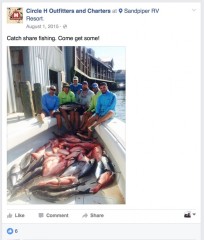 The future of recreational fishing in the Gulf of Mexico is for sale in Texas. While charter boats and private recreational anglers in the Gulf were only allowed to catch red snapper in federal waters on 10 days last year, two companies in Galveston, Texas have been taking recreational anglers red snapper fishing all year round. The Texas companies have been getting around the federal limits and seasons by selling the “Catch Shares Fishing Experience.” The Texas companies involved own “catch shares” of the commercial red snapper fishery that allow them to harvest a set number of pounds per year for commercial sale. Instead of catching those fish with a professional crew and selling them to a fish house, the captains are taking recreational anglers fishing and letting them buy the fish afterward. Read the article here 07:54
The future of recreational fishing in the Gulf of Mexico is for sale in Texas. While charter boats and private recreational anglers in the Gulf were only allowed to catch red snapper in federal waters on 10 days last year, two companies in Galveston, Texas have been taking recreational anglers red snapper fishing all year round. The Texas companies have been getting around the federal limits and seasons by selling the “Catch Shares Fishing Experience.” The Texas companies involved own “catch shares” of the commercial red snapper fishery that allow them to harvest a set number of pounds per year for commercial sale. Instead of catching those fish with a professional crew and selling them to a fish house, the captains are taking recreational anglers fishing and letting them buy the fish afterward. Read the article here 07:54
Red-snapper limits help Louisiana’s restaurants and economy: Brett Veerhusen and Haley Bittermann
 Louisiana catches about 1 billion pounds of seafood every year for commercial sale, and with the demand for local seafood at an all-time high, we rely on our nation’s fishery management process to ensure sustainable fisheries. Louisiana restaurants rely on locally sourced, sustainably managed seafood. Close to 70 percent of seafood harvested off the Gulf Coast is landed in Louisiana. Chances are your delicious plate of red snapper is from one of our many locally run Gulf fisheries. Read the rest here 10:13
Louisiana catches about 1 billion pounds of seafood every year for commercial sale, and with the demand for local seafood at an all-time high, we rely on our nation’s fishery management process to ensure sustainable fisheries. Louisiana restaurants rely on locally sourced, sustainably managed seafood. Close to 70 percent of seafood harvested off the Gulf Coast is landed in Louisiana. Chances are your delicious plate of red snapper is from one of our many locally run Gulf fisheries. Read the rest here 10:13
In the Gulf – Effects of Illegal Fishing on Local Fishing Industry
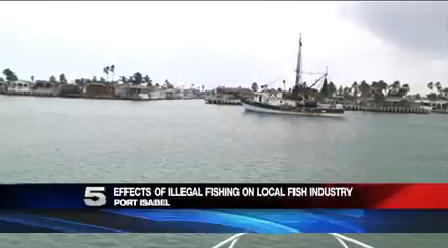 Over 1,000 pounds of red snapper were seized from a lancha by the U.S. Coast Guard. There were 4 Mexican nationals aboard the boat. They were taken to the U.S. Coast Guard at the island. A charter fisherman said when people fish illegally his profits take a big hit. It can also drain a fishing spot. “Everything changed. We didn’t catch anything in that area, nothing. We didn’t even mark anything on our fish finder. It was absolutely zero,” Michael Walker said. Walker takes people out to fish. If there are no fish to catch, it can result in the loss of a customer. Read the rest here 09:19
Over 1,000 pounds of red snapper were seized from a lancha by the U.S. Coast Guard. There were 4 Mexican nationals aboard the boat. They were taken to the U.S. Coast Guard at the island. A charter fisherman said when people fish illegally his profits take a big hit. It can also drain a fishing spot. “Everything changed. We didn’t catch anything in that area, nothing. We didn’t even mark anything on our fish finder. It was absolutely zero,” Michael Walker said. Walker takes people out to fish. If there are no fish to catch, it can result in the loss of a customer. Read the rest here 09:19
Gulf Fishermen Sue Feds Over Red Snapper Quota Rule
 In anticipation of clawing back red snapper quotas from Gulf Coast commercial fishers, feds have “frozen” red snapper fishing altogether, a group of fishermen claim in court. Following the proposal of a Republican-supported bill last fall with strong support from recreational fishermen that would have wrested control of red snapper regulations from the feds and placed it in the hands of individual states, the federal agencies in charge of regulation moved instead to grant recreational fishermen higher quotas for fish they are allowed to catch. Read the article here 15:40
In anticipation of clawing back red snapper quotas from Gulf Coast commercial fishers, feds have “frozen” red snapper fishing altogether, a group of fishermen claim in court. Following the proposal of a Republican-supported bill last fall with strong support from recreational fishermen that would have wrested control of red snapper regulations from the feds and placed it in the hands of individual states, the federal agencies in charge of regulation moved instead to grant recreational fishermen higher quotas for fish they are allowed to catch. Read the article here 15:40
Officials calling for more accurate fish counts
 The federal agency in charge of the nation’s fisheries should do a better job counting fish so it can develop proper catch limits for recreational anglers, a report by Congress’ investigative arm concludes. The analysis by the Government Accountability Office was requested nearly three years ago by several Republican senators from the Gulf Coast who believe the Obama administration may have been overly restrictive in imposing catch limits on several popular fish, including red snapper. Read the article here 09:10
The federal agency in charge of the nation’s fisheries should do a better job counting fish so it can develop proper catch limits for recreational anglers, a report by Congress’ investigative arm concludes. The analysis by the Government Accountability Office was requested nearly three years ago by several Republican senators from the Gulf Coast who believe the Obama administration may have been overly restrictive in imposing catch limits on several popular fish, including red snapper. Read the article here 09:10
Red Snapper Fisherman Charged with Illegal Gear in State Waters
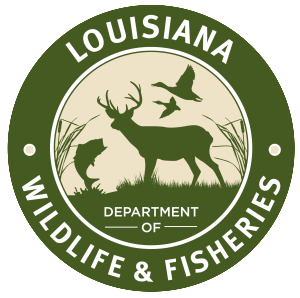 Enforcement agents cited Seven P. Rhoto, 37, for using bandit gear in state waters. Bandit gear is allowed to be used in federal waters and is normally used by federally permitted reef fish holders, but is illegal in Louisiana water. Agents observed a vessel using bandit gear fishing for red snapper near the mouth of the Mississippi River in Plaquemines Parish. Upon inspection of the vessel, agents found Rhoto in possession of 1,088 pounds of red snapper, 44 pounds of lane snapper and 17 pounds of white trout. Read the rest here 12:45
Enforcement agents cited Seven P. Rhoto, 37, for using bandit gear in state waters. Bandit gear is allowed to be used in federal waters and is normally used by federally permitted reef fish holders, but is illegal in Louisiana water. Agents observed a vessel using bandit gear fishing for red snapper near the mouth of the Mississippi River in Plaquemines Parish. Upon inspection of the vessel, agents found Rhoto in possession of 1,088 pounds of red snapper, 44 pounds of lane snapper and 17 pounds of white trout. Read the rest here 12:45
Video – Louisiana anglers want control of red-snapper fishery, survey shows
 This year for the first time, NOAA Fisheries separated the recreational charter fleet from private-boat anglers, offering federally licensed guides a 44-day red snapper season. That move seemed to be popular with survey respondents. Among private-boat anglers, 53 percent said the groups should be managed separately, either by the state or the feds. Sector separation was even more popular with federally permitted guides, with 65 percent saying they support it. Read the rest here 12:23
This year for the first time, NOAA Fisheries separated the recreational charter fleet from private-boat anglers, offering federally licensed guides a 44-day red snapper season. That move seemed to be popular with survey respondents. Among private-boat anglers, 53 percent said the groups should be managed separately, either by the state or the feds. Sector separation was even more popular with federally permitted guides, with 65 percent saying they support it. Read the rest here 12:23
Sport fishermen win greater share of red snapper catch
 On Thursday, the Gulf of Mexico Fishery Management Council increased the share of the catch going to recreational fishermen — made up of charter boats and non-commercial anglers. The council met in New Orleans. The change gives recreational fishermen 51.5 percent of the total catch and commercial fishermen 48.5 percent. Currently the catch is split 50-50. The change needs the approval of the U.S. Commerce Department. Commercial fishermen opposed giving recreational fishermen a greater share and said the shift would keep red snapper off the tables of restaurants. Read the rest here 19:31
On Thursday, the Gulf of Mexico Fishery Management Council increased the share of the catch going to recreational fishermen — made up of charter boats and non-commercial anglers. The council met in New Orleans. The change gives recreational fishermen 51.5 percent of the total catch and commercial fishermen 48.5 percent. Currently the catch is split 50-50. The change needs the approval of the U.S. Commerce Department. Commercial fishermen opposed giving recreational fishermen a greater share and said the shift would keep red snapper off the tables of restaurants. Read the rest here 19:31
State control of red snapper fisheries creates problems – Tom Marvel, owner/operator, F/V Sea Marvel
 Much has been written about the ongoing debate over red snapper, most recently by J. Scott Butherus of the Naples Daily News in July. I would like to offer a different perspective. The article criticizes the Gulf of Mexico Fisheries Management Council for treating red snapper as one homogeneous group and therefore managing them as such. However, biologically they are one group. It seems the article takes issue with current management, more so with how fishermen are managed as opposed to how the fish are managed. Read the rest here 08:49
Much has been written about the ongoing debate over red snapper, most recently by J. Scott Butherus of the Naples Daily News in July. I would like to offer a different perspective. The article criticizes the Gulf of Mexico Fisheries Management Council for treating red snapper as one homogeneous group and therefore managing them as such. However, biologically they are one group. It seems the article takes issue with current management, more so with how fishermen are managed as opposed to how the fish are managed. Read the rest here 08:49
U.S. senators want longer red snapper season, Gulf Council looks at reallocation!
 Despite a letter from U.S. Sen. Bill Nelson and Marco Rubio, the National Oceanic and Atmospheric Administration (NOAA) is not looking to extend the federal recreational red snapper season for 2015. (shoulda known that, fellas) NOAA Southeast Regional Administrator Roy Crabtree predicted one of the items the council will vote on at its August (GMFMC)meeting is moving 390,000 pounds of catching capacity from the commercial sector to recreational, thus extending the season. Read the rest here 20:46
Despite a letter from U.S. Sen. Bill Nelson and Marco Rubio, the National Oceanic and Atmospheric Administration (NOAA) is not looking to extend the federal recreational red snapper season for 2015. (shoulda known that, fellas) NOAA Southeast Regional Administrator Roy Crabtree predicted one of the items the council will vote on at its August (GMFMC)meeting is moving 390,000 pounds of catching capacity from the commercial sector to recreational, thus extending the season. Read the rest here 20:46
Rubio, Nelson want an open red snapper season
Last week, 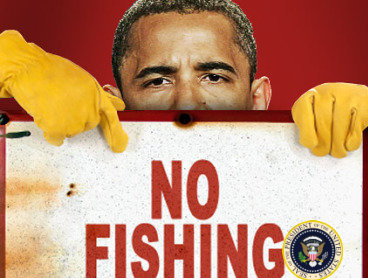 announced the red snapper fishery will remain closed in South Atlantic federal waters in 2015 because of overfishing..Florida’s senators are asking the Obama administration to review its decision not to open up the South Atlantic to red snapper fishing. “There will not be commercial or recreational seasons in 2015 because the total number of red snapper removed from the population in 2014 exceeded the allowable level,” the notice said. Read the rest here
announced the red snapper fishery will remain closed in South Atlantic federal waters in 2015 because of overfishing..Florida’s senators are asking the Obama administration to review its decision not to open up the South Atlantic to red snapper fishing. “There will not be commercial or recreational seasons in 2015 because the total number of red snapper removed from the population in 2014 exceeded the allowable level,” the notice said. Read the rest here
Red Snapper: management of a public resource gone completely haywire. And we’re paying to have this done to us.
 It’s important to note here that the total allowable take isn’t based solely on the feds’ vague guesswork on the number of landings. No, they add in what they believe to be the discard mortality rates — that of fish released and dying sometime later, predominately because of barotrauma. That occurs to differing extents when fish are brought up from depths and their air bladders expand too quickly — and don’t return to normal quickly enough when released. The federal scientists use a number to determine how often this happens. In the case of snapper, they speculate that 40 percent of all released fish die in the recreational sector and 60 percent in the commercial sector. Read the rest here 09:33
It’s important to note here that the total allowable take isn’t based solely on the feds’ vague guesswork on the number of landings. No, they add in what they believe to be the discard mortality rates — that of fish released and dying sometime later, predominately because of barotrauma. That occurs to differing extents when fish are brought up from depths and their air bladders expand too quickly — and don’t return to normal quickly enough when released. The federal scientists use a number to determine how often this happens. In the case of snapper, they speculate that 40 percent of all released fish die in the recreational sector and 60 percent in the commercial sector. Read the rest here 09:33
South Atlantic Fishery Management Council – No red snapper take in 2015
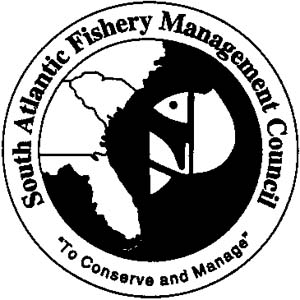 The South Atlantic Fishery Management Council announced Friday, there will not be commercial or recreational season in 2015 because the total number of red snapper removed from the population in 2014 exceeded the allowable level. In other news, the SAFMC also announced that no more recreational harvest of blueline tilefish in South Atlantic waters will be allowed after 12:01 a.m. (local time) Wednesday. The commercial sector for blueline tilefish was closed to harvest on April 7. Read the rest here 13:02
The South Atlantic Fishery Management Council announced Friday, there will not be commercial or recreational season in 2015 because the total number of red snapper removed from the population in 2014 exceeded the allowable level. In other news, the SAFMC also announced that no more recreational harvest of blueline tilefish in South Atlantic waters will be allowed after 12:01 a.m. (local time) Wednesday. The commercial sector for blueline tilefish was closed to harvest on April 7. Read the rest here 13:02
Letter: It’s time to resolve the conflicts over national red snapper fishing rules – Mark Mathews
 Red snapper is the most mismanaged fish in this country. I consider many charter captains dear friends. They are important friends and clients, and I try very hard to promote their businesses as much as I can. My criticism is not of them but of the environmentalists (EDF) who have shamelessly and unnecessarily come to our region to create conflicts and turn fishing friends against each other and the federal fisheries managers who have encouraged those conflicts. Read the rest here 11:08
Red snapper is the most mismanaged fish in this country. I consider many charter captains dear friends. They are important friends and clients, and I try very hard to promote their businesses as much as I can. My criticism is not of them but of the environmentalists (EDF) who have shamelessly and unnecessarily come to our region to create conflicts and turn fishing friends against each other and the federal fisheries managers who have encouraged those conflicts. Read the rest here 11:08
Are you as sick of Red Snapper Crap in the Reauthorization as I am?
 I’m reading this article about Rep. Garret Graves, R-Baton Rouge resurrecting his Red Snapper bill that was flushed during the House vote of HR1335. It appears that political pandering is the reason. The recreational people have a beef about getting shorted in the number of days they can fish, but to look at the allocation percentage, or the year round commercial fishery as the reason, is wrong. This issue is another NOAA created crisis. Read the article here 18:41
I’m reading this article about Rep. Garret Graves, R-Baton Rouge resurrecting his Red Snapper bill that was flushed during the House vote of HR1335. It appears that political pandering is the reason. The recreational people have a beef about getting shorted in the number of days they can fish, but to look at the allocation percentage, or the year round commercial fishery as the reason, is wrong. This issue is another NOAA created crisis. Read the article here 18:41
Rep. Bradley Byrne argues for new red snapper rules in face of Obama veto threat
 Even as members of the U.S. House began debate on changes to the act that regulates the nation’s fisheries, the Obama administration indicated that the president would be advised to veto the revised legislation. The bill has the support of a diverse group of businesses, organizations and individuals representing fishermen and fishing communities from the East, West and Gulf coasts, who jointly signed a letter supporting HR 1335. The letter states its opposition, however, to a proposal from the five Gulf state marine resources directors,, Read the rest here 15:48
Even as members of the U.S. House began debate on changes to the act that regulates the nation’s fisheries, the Obama administration indicated that the president would be advised to veto the revised legislation. The bill has the support of a diverse group of businesses, organizations and individuals representing fishermen and fishing communities from the East, West and Gulf coasts, who jointly signed a letter supporting HR 1335. The letter states its opposition, however, to a proposal from the five Gulf state marine resources directors,, Read the rest here 15:48
Rep. John Fleming: Congress not going to gut red-snapper management for benefit of recreational anglers
 Freshman Rep. Garret Graves (R-La.) proposed an amendment in a House Natural Resources Committee meeting last week that would have transferred red-snapper management authority from the federal government to the states. Rep. John Fleming, Louisiana’s only other representative on the committee, abstained from voting on Graves’ amendment, which drew the ire of recreational fishing-industry leaders. In an interview with NOLA.com | The Times-Picayune, he explained his reasons for not voting: Read the rest here 12:12
Freshman Rep. Garret Graves (R-La.) proposed an amendment in a House Natural Resources Committee meeting last week that would have transferred red-snapper management authority from the federal government to the states. Rep. John Fleming, Louisiana’s only other representative on the committee, abstained from voting on Graves’ amendment, which drew the ire of recreational fishing-industry leaders. In an interview with NOLA.com | The Times-Picayune, he explained his reasons for not voting: Read the rest here 12:12
Charter captain refutes red snapper commentary
 The “scheme” discussed in the commentary by Mr. Brown (4-15-15 issue) is not that the five state plan will destroy the commercial fishery -far from it, as all the states fully understand the importance of the commercial fishery providing safe local seafood to the consumer. The “scheme” is from the many commercial red snapper IFQ (Individual Fishing Quota) owners who mislead the consumers, the seafood houses and restaurants about what they want to do with their commercially harvested red snapper. Read the rest here 08:16
The “scheme” discussed in the commentary by Mr. Brown (4-15-15 issue) is not that the five state plan will destroy the commercial fishery -far from it, as all the states fully understand the importance of the commercial fishery providing safe local seafood to the consumer. The “scheme” is from the many commercial red snapper IFQ (Individual Fishing Quota) owners who mislead the consumers, the seafood houses and restaurants about what they want to do with their commercially harvested red snapper. Read the rest here 08:16
Red Snapper scheme could destroy fishery
 If this scheme becomes law, it could soon become difficult or impossible to legally buy American Red Snapper. Retailers, restaurants and grocery stores will be simply unable to provide consumers with the genuine American Red Snapper that is increasingly popular across the country. Read the rest here 09:40
If this scheme becomes law, it could soon become difficult or impossible to legally buy American Red Snapper. Retailers, restaurants and grocery stores will be simply unable to provide consumers with the genuine American Red Snapper that is increasingly popular across the country. Read the rest here 09:40
Battle for red snapper begins in Gulf
“The National Oceanic Atmospheric Administration’s  has failed to adequately account for the size and well being of the red snapper stock in the Gulf of Mexico,” Byrne says. “They have continued to use outdated and ineffective methods to each sample for red snapper and measure how many fish are getting caught as soon as the season begins, and they have frankly lost all credibility.” Read the rest here 09:50
has failed to adequately account for the size and well being of the red snapper stock in the Gulf of Mexico,” Byrne says. “They have continued to use outdated and ineffective methods to each sample for red snapper and measure how many fish are getting caught as soon as the season begins, and they have frankly lost all credibility.” Read the rest here 09:50
Transferring red-snapper control to states is adored and despised – the current mess created by federal mismanagement.
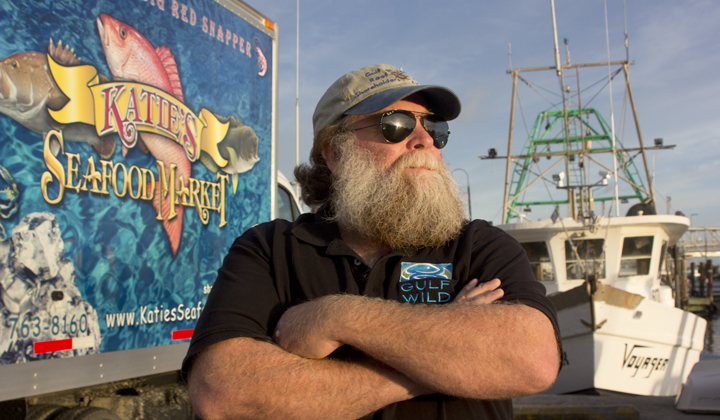 “There is now no question in our minds that our state directors do not represent the best interests of commercial fishermen. They fight us at every turn, trying to destabilize our business plans and promote half-baked ideas that hurt conservation and undermine sustainability. This scam will hurt hardworking commercial fishermen and the American public that wants to eat fresh, sustainably harvested red snapper.” — Buddy Guindon, executive director of the Gulf of Mexico Reef Fish Shareholders’ Alliance, Read the rest here photo 16:33
“There is now no question in our minds that our state directors do not represent the best interests of commercial fishermen. They fight us at every turn, trying to destabilize our business plans and promote half-baked ideas that hurt conservation and undermine sustainability. This scam will hurt hardworking commercial fishermen and the American public that wants to eat fresh, sustainably harvested red snapper.” — Buddy Guindon, executive director of the Gulf of Mexico Reef Fish Shareholders’ Alliance, Read the rest here photo 16:33






